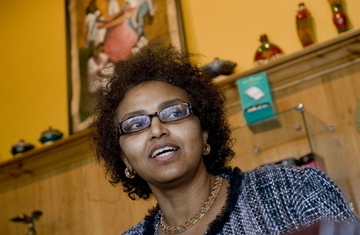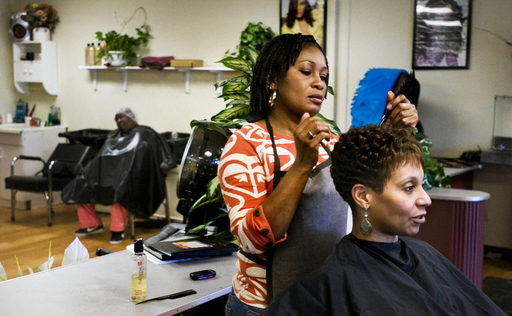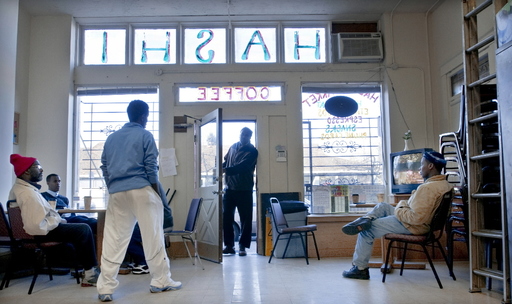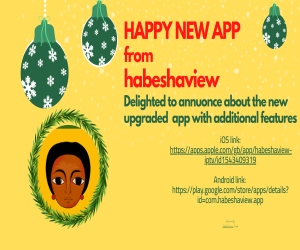
Above: Ethiopian immigrant Sonya Damtew features injera
and sweet potato pie at her Killingsworth cafe. Damtew says
the African American and African communities are one and
that she considers her own child — who was born here —
to be African American. (Benjamin Brink/The Oregonian)
By Nikole Hannah-Jones,
Sunday January 18, 2009,
In a stylish beauty salon on Killingsworth Street, Snoop Dogg thumps over the buzz of hair dryers and Barack Obama fliers are tacked to the mirrors. Salon owner Jestina Fasasi peeks through a plume of smoke rising from the hot curlers and gossips in a thick Sierra Leone accent with her African American client.
To the shop’s left, an Ethiopian cafe bustles with a lunchtime rush, and the Nigerian-owned African International Food Market displays a sign saying the owner will return in an hour. Tucked in the heart of Portland’s traditionally black neighborhoods, a little Africa is emerging.
On Martin Luther King Jr. Boulevard from Sacramento to Killingsworth streets and west on Killingsworth to Michigan Avenue, about a dozen African-owned businesses share the streets with longtime soul food joints and black barbershops and the new feminist bookstores and posh cafes ushered in by gentrification.
The African grocers, restaurants and beauty shops create a sharp visual of how Portland’s black population is changing. As more African Americans move to the suburbs, an infusion of African immigrants is the only thing holding Portland’s small black population of 35,000 steady.

Nearly all of Sierra Leone immigrant Jestina Fasasi’s clients at Salon Radiance
are African American. Fasasi’s salon is one of a handful of African-owned businesses
on Killingsworth Street between Martin Luther King Jr. Boulevard and Michigan Avenue.
(Benjamin Brink/The Oregonian)
Recent census estimates show Portland’s population of U.S.-born African Americans has declined slightly since 2000. But its African-born population increased nearly 90 percent from 2000 to 2007 and now makes up about 12 percent of the black population.
Just as President-elect Barack Obama’s heritage has spurred a conversation about African American identity — his father was a Kenyan immigrant who met his mother while attending school in Hawaii — the influx of African immigrants here is spurring a changing definition of Portland’s black community.
“We’ve been watching this evolve over a period of time,” says Avel Gordly, Oregon’s first black female state senator and a black studies professor at Portland State University. “It provides a rich and wonderful opportunity for African Americans to connect with their culture, to move past stereotypes that say Africans and African Americans don’t have anything in common.”
African immigrants first trickled into Oregon in the 1970s, mainly as students from West African countries. In the 1980s, resettlement agencies began to relocate refugees from war-torn nations such as Sudan, Eritrea and Ethiopia to the Portland area, and those numbers accelerated in the 1990s and this decade, according to the U.S. Census Bureau, with refugees coming from Somalia, Liberia, Chad and Togo.
Portland is 12th in the nation for refugee resettlement, according to a 2007 report by the Brookings Institution, bringing in 34,000 refugees from across the globe between 1984 and 2003. But it’s also one of the whitest cities in the country.
Ethiopian immigrant Sonya Damtew was 16 when she came to live with a white host family in Salem to attend school. The family didn’t know any black people, Damtew says. When she watched “Roots” she cried for a week and felt even more alienated. This was the history of her host family’s country, she says, and they didn’t know it.
“Before coming here, I understood class and gender,” says Damtew, 47. “Race I had to learn. I had to learn it the hard way.”
Damtew went on to work for an organization that assisted resettlement agencies with African refugees. These days, she runs a chic restaurant called E’Njoni Cafe on Killingsworth.
As a sweet aroma of cloves and ginger swirls along walls painted the color of red lentils and ocher, she explains how the resettlement agencies she worked with tried to ease the refugees’ transition by plopping them into African American neighborhoods.
But the African and African American communities didn’t always mesh well at first.
In trying to teach American history to the new immigrants, for example, the agencies showed documentaries with the footage of race riots and civil rights protesters being hosed down by police, she says. The images led some African immigrants to view African Americans as violent and morally broken, she says.
“For years, there was no connection,” Damtew says.
Resistance came from the African American side as well.
Fasasi, the salon owner, recalls taking courses at Portland Community College and asking an African American woman why she was always so unfriendly.
“She told me, ‘Africans sold us into slavery. You can come here today and then back home and have your culture, but all I have is this,’” Fasasi says. “I couldn’t believe it.”
Such friction between native-born and immigrant groups is common, says Portland State University black studies chair Dalton Miller-Jones. “We have very different histories. But in time, Africans begin to assimilate into African Americans.”
Through the years, Damtew says, she’s seen both communities open up to each other.
Older immigrants who fought to hold onto their cultural identities became more American through their children, who readily identified with African Americans. They attended African American churches and listened to African American music. African Americans who at first looked on their new neighbors with suspicion found friends who could connect them to a culture lost through slavery.
The groups realized their common threads. They ate some of the same foods: yams, black-eyed peas, collard greens. Their homes were often multigenerational. Their music carried a similar beat. Even their mannerisms at times echoed each other.
“It’s things like the universal head nod,” says McGodson Ben-Jumbo, a 23-year-old son of Nigerian immigrants and a Portland State student. “The cultures overlap.”
But more than anything, says Miller-Jones, the common American racial experience united them.
Fasasi puts her next African American client under the dryer, then says she considers the African community distinct from African Americans.
Yet she also notes that people often don’t see the difference. She points to the 1988 hate-crime murder of an Ethiopian immigrant in Portland and says no matter whether a person is African or African American, they are both black and will get treated the same.
After two decades in this country, she says, she has a good relationship with her African American clients — who account for most of her business. “They like me, and to me, I have taken on some American ways.” She grins. She enjoys black music and has adopted some slang.

Omar Hashi opened Hashi Halal Market on Killingsworth about six months ago.
The meat market is also a gathering spot for members of the Somali community.
(Benjamin Brink/The Oregonian)
Immigrants who’ve landed in Portland more recently have found a community that already has a place for them.
Yonnas Yilma arrived from Ethiopia nearly seven years ago. Portland’s black community felt like home, he says.
“When I first came here, (African Americans) clasped my hand and said, ‘Hey, brother,’” Yilma recalls from a table in Sengatera, the small Ethiopian eatery he opened seven months ago on MLK. “That touched my heart.”
He still prefers Ethiopian music — though he enjoys American gospel and old-school hip-hop –and he can’t adjust to eating anything other than food from his homeland. But it doesn’t matter.
“I don’t believe we’re separate.” He slaps his hand together. “We’re together. In my heart, black is black.”
For longtime Northeast Portland resident Kecia Parker, the Somali meat shop, Ethiopian restaurants and African markets are a welcome addition, in part because she’s glad to see more black businesses in a neighborhood that’s becoming less so and because they add new flavor to the black experience.
“They are part of the community but distinct,” Parker says. “Everyone doesn’t have to assimilate.”
The African American community has never been monolithic, Miller-Jones says. Groups from Africa, the Caribbean and Latin America have seasoned the culture.
Portland’s small African American community, he says, will feel the impact of the African influx more intensely. Last year, Portland saw a 26-year-old Liberian immigrant and Jefferson High grad become the nation’s youngest NAACP branch president.
Damtew sees America’s president-elect as the bridge between Africans and African Americans — and as a symbol to emulate.
Along with the Ethiopian kaffa (coffee) brewing in the traditional jebena, she stocks her dessert case with an African American favorite: sweet potato pie.
“African American is birth and tradition, but it’s also who people say you are,” she says. “It’s not enough to be African, because that’s just who you are by yourself. If you are African American, then you are part of a community.”


























I need an Ethiopian brother or sister i am in Portland i need my peopel i am lonely and need help for that
Hi there!!!
I want to know the name and address of an Ethiopian woman Professor who is originally from Kaffa,can please help me?